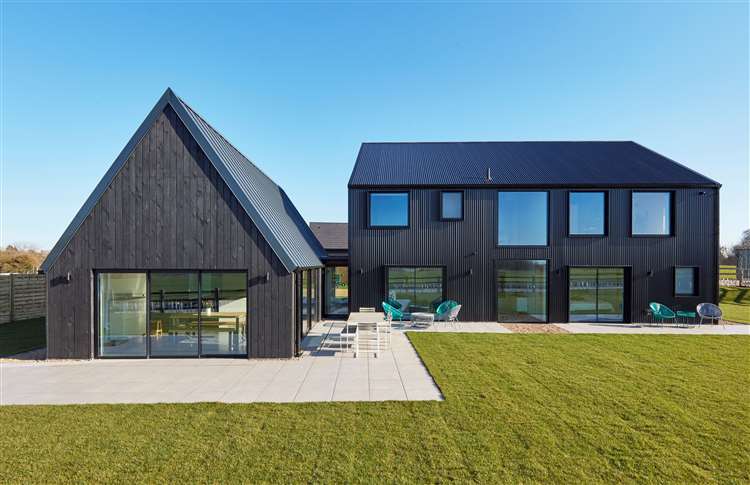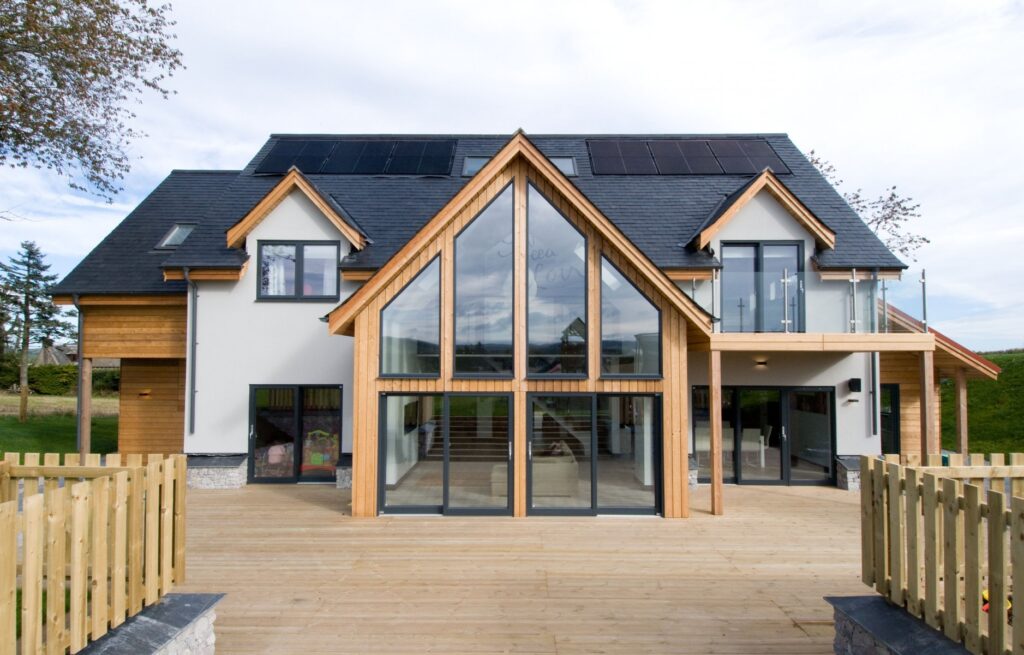Understanding the Self-Build Boom in the UK
In recent years, the idea of self-building a home in the UK has moved from a niche ambition to a serious consideration for thousands. As the housing crisis deepens, construction costs fluctuate, and people crave more autonomy over where and how they live, the self-build movement has gained momentum. In 2025, with government-backed incentives and a growing demand for sustainable, custom-designed homes, the UK self-build sector is more relevant than ever.
The Rise in Demand Post-Pandemic
The COVID-19 pandemic reshaped how people think about their homes. Remote working led many to escape urban life, prompting interest in rural or suburban plots. People now seek multi-functional spaces, outdoor access, and energy efficiency—things often lacking in conventional new builds. The self-build path promises the freedom to design exactly what you need.
Government Support and Schemes
The UK government launched several schemes to encourage self-builds, including the Right to Build register and the Help to Build equity loan scheme. These initiatives aim to simplify access to land, offer financial aid, and reduce planning friction for individual homebuilders. In 2025, local councils are even more accountable for making serviced plots available to those registered under these programs.

Pros and Cons of Self-Building a Home
Advantages
- Customization: You can design every detail to suit your lifestyle.
- Potential Cost Savings: By cutting out developer profits and using modern building techniques, many self-builders save 20–30% compared to buying a similar home.
- Energy Efficiency: Many self-build homes exceed building code minimums, reducing long-term utility costs.
Disadvantages
- Time and Effort: Building a home takes 12–24 months and demands daily involvement or trusted project managers.
- Risk of Budget Overruns: Unexpected costs—like planning delays or rising materials prices—can derail your budget.
- Planning and Legal Complexity: Navigating permissions, land restrictions, and inspections requires patience and expertise.

How the UK Planning System Affects Self-Build Projects
Planning permission remains a critical—and often frustrating—aspect of any self-build journey.
Dealing with Local Authorities
Each council in the UK has its own Local Plan that determines what can be built and where. Some are more self-build-friendly than others, depending on their housing targets and available land.
Green Belt and Protected Areas
Building in protected zones like green belt land is notoriously difficult. Even if a plot seems perfect, restrictions could halt your project before it starts. In 2025, digital planning portals help clarify what’s feasible, but speaking to a planning consultant is often worthwhile.
Financial Considerations: Is Self-Build Cheaper Than Buying?
Building your own home can be cheaper than buying, but only if you manage your budget smartly.
Types of Self-Build Mortgages
Unlike regular mortgages, self-build loans release funds in stages as construction progresses. Lenders such as BuildStore, Ecology Building Society, and Virgin Money offer tailored products.
Cost Breakdown Comparison
| Expense | Self-Build (Average) | Buying New Build (Average) |
|---|---|---|
| Land | £100,000 | — |
| Planning & Design | £15,000 | — |
| Construction | £200,000 | — |
| Professional Fees | £25,000 | — |
| Total | £340,000 | £400,000+ |
While these figures vary by region and specification, a well-managed self-build can cost significantly less for a similar square footage and finish.

Finding Land in the UK: Is It Even Possible in 2025?
The UK’s biggest self-build challenge has always been finding land—especially in urban and commuter-friendly areas.
Availability and Affordability
In 2025, land remains scarce in London and Southeast England, but Northern regions, Wales, and Scotland have more affordable, accessible plots.
Where to Look
- Plotfinder.net
- Zoopla Land & Development Section
- Land Agents and Auctions
- NaCSBA’s Right to Build Portal
Networking locally and watching auction listings can uncover hidden gems.
Timeline of a Typical Self-Build Project in the UK
Here’s how a UK self-build project typically unfolds:
- Land Acquisition – 1-3 months
- Planning Permission – 3-6 months
- Design & Tendering – 2-4 months
- Construction – 8-14 months
- Finishing & Move-In – 1-2 months
Total: 15–24 months depending on complexity and efficiency.
Essential Professionals You’ll Need for a UK Self-Build
To ensure a smooth process, surround yourself with a skilled team:
- Architect – Designs and navigates planning.
- Structural Engineer – Ensures safety and compliance.
- Quantity Surveyor – Manages cost and materials.
- Project Manager or Builder – Coordinates trades.
- Solicitor & Land Surveyor – Handles legal and boundary checks.
Skipping these experts may seem like a way to cut costs, but it usually costs more in the long run.
Popular Self-Build Methods in 2025
Thanks to modern innovations, building your own home has never offered more variety.
Timber Frame Construction
Fast, lightweight, and eco-friendly—perfect for energy-conscious builds.
Modular and Prefabricated Homes
Built off-site and assembled in days. Costs are more predictable, and quality is high.
Traditional Brick and Block
Still popular for those who want a classic UK home with high thermal mass.
Sustainability and Eco-Friendly Self-Building Options
In 2025, sustainability isn’t just a nice-to-have—it’s a must. With the UK government pushing for net-zero carbon emissions by 2050, eco-conscious self-building is more popular than ever.
Green Building Materials
Modern self-builders increasingly opt for:
- Reclaimed timber and bricks
- Hempcrete and straw bale
- Low-VOC paints and natural insulation
These not only reduce environmental impact but also contribute to healthier indoor air quality.
Smart Home Features
From solar panels and air-source heat pumps to greywater recycling systems and smart energy meters, integrating technology helps homeowners reduce energy consumption—and long-term costs.
Government Incentives
The UK government offers Green Homes Grants (where applicable), zero-rated VAT on new self-build homes, and support for installing renewable tech, making it financially feasible to go green from the start.
Legal and Insurance Requirements for Self-Builders
Self-building in the UK involves several legal responsibilities.
Planning Permission & Building Regulations
Every self-build must:
- Obtain full planning permission
- Comply with Building Regulations (Part A to Part P)
- Pass site inspections at key construction stages
Insurance Must-Haves
- Site Insurance: Protects against accidents or theft during construction.
- Structural Warranty: 10-year cover (e.g., from NHBC or Self-Build Zone) that’s essential for resale or mortgage eligibility.
- Employer’s Liability Insurance: Required if you hire trades directly.
Challenges First-Time Self-Builders Face
Building your own home is rewarding, but not without hurdles.
Common Pitfalls
- Underestimating Costs: Many overlook landscaping, fees, or utilities.
- Project Management Stress: Without experience, timelines can slip.
- Changing Regulations: Planning and green building rules evolve quickly.
Being flexible and hiring the right help can mitigate most of these issues.
Is Buying a Home Still the Smarter Option in 2025?
Despite the appeal of self-building, buying a ready-made home remains the default for many.
Why Buying Might Still Win
- Speed: Move-in ready homes save time and stress.
- Mortgage Simplicity: Conventional mortgages are easier to obtain.
- Fixed Costs: Less risk of budget overruns.
However, for those seeking uniqueness, efficiency, and investment potential, self-building can still be the better route.
Government Help for Self-Builders in the UK
If you’re considering building your own home, the UK government is surprisingly supportive.
Right to Build Register
Local councils must keep a register of those interested in self-building. By law, they’re expected to grant permission for enough plots to meet this demand within 3 years.
Help to Build Scheme
This equity loan offers up to 20% of land and build costs (40% in London) with just a 5% deposit. It works alongside a self-build mortgage, making it accessible to first-timers.
Inspiring Self-Build Success Stories from 2025
- The Taylor Family in Cornwall
Built a four-bedroom eco-home with a £280k budget. They used SIP panels and achieved net-zero emissions. - Single Dad in Yorkshire
Converted an old barn into a sleek, modern home for under £200k, using salvaged materials and local trades. - Couple in Wales
Completed their timber-frame dream home with solar heating and smart tech integration—all within 12 months.
These stories prove that with planning and passion, self-building is not only possible but life-changing.
Key Tools and Platforms to Help You Self-Build
Here’s a list of the most useful resources for 2025 self-builders:
| Tool/Platform | Purpose |
|---|---|
| Plotfinder.net | Find available land across the UK |
| BuildStore | Compare self-build mortgages |
| NaCSBA | Legal updates and government scheme tracking |
| Grand Designs Live | Learn from experts and meet suppliers |
| Planning Portal | Submit applications and review regulations |
FAQs About Self-Building in the UK in 2025
1. Is self-building actually cheaper than buying a house?
Yes, if managed well. Many save 20–30% versus buying a similar property from a developer.
2. Can I get a mortgage for a self-build project?
Absolutely. Self-build mortgages release funds in stages and require detailed planning, but several UK banks offer them.
3. How do I find land for self-building?
Use platforms like Plotfinder, Zoopla Land, or local estate agents. Also, register with your local authority’s Right to Build list.
4. What insurance do I need as a self-builder?
You’ll need site insurance, a 10-year structural warranty, and employer’s liability if hiring trades directly.
5. How long does it take to complete a self-build home?
Typically 15–24 months from buying land to moving in, depending on complexity and location.
6. Is it legal to live in a caravan on-site during construction?
Yes, usually—but you may need temporary planning permission from the council. Always check local rules.
Final Verdict: Is Self-Building in the UK Worth It in 2025?
Self-building isn’t for everyone. It takes time, patience, and a willingness to juggle multiple roles—or hire someone to do that for you. But for those who want to live in a tailor-made home, value energy efficiency, or simply escape cookie-cutter estates, 2025 is a prime time to act.
With better access to land, more supportive legislation, and new building technologies, the UK has never been more open to individual homebuilders. If you’ve been on the fence about whether to build or buy—this year might just tip the scales.
Leave a Reply